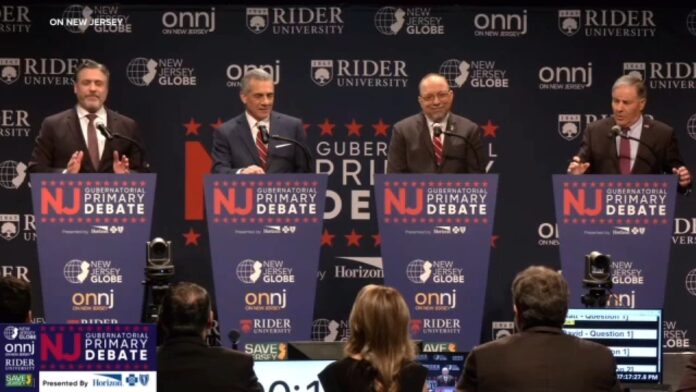Explore New Jersey Politics: Where the GOP Stands in 2025
The Republican race for New Jersey governor took center stage in a televised debate Wednesday night that brought clarity—if not consensus—on where the major candidates stand. In a state where party identity is evolving, the NJ PBS Republican Gubernatorial Debate offered a revealing look at the ideological rifts within the GOP.
The hour-long debate featured three contenders who’ve each carved out distinctly different paths within the Republican Party: State Senator Jon Bramnick, former Assemblyman and 2021 nominee Jack Ciattarelli, and conservative radio personality Bill Spadea.
While candidates typically sidestep sharp distinctions during debates, this one was different. It laid bare the ideological spectrum within New Jersey’s Republican base—from traditional moderates to unapologetic far-right populists.
A Party Divided: From Compassion to Combat
If this debate had a theme, it was clear: The soul of New Jersey’s GOP is up for grabs.
Jon Bramnick, often dubbed the “last moderate,” stood out as the most centrist—or even left-leaning—voice on stage, at least by MAGA standards. Referencing former Governor Thomas H. Kean Sr.’s book The Politics of Inclusion, Bramnick pushed for empathy and a more inclusive Republican message.
“If the Republican Party does not show empathy, we’re going to get beat,” Bramnick warned. “That’s why Democrats fear me the most.”
On the opposite end of the spectrum stood Bill Spadea, an outspoken populist who framed his campaign in culture war rhetoric and hardline immigration policies. His position? The party needs to go further right—not back off.
Jack Ciattarelli, who nearly unseated Governor Phil Murphy in 2021, tried to thread the needle. He emphasized pragmatic conservatism, distancing himself from extremes while still maintaining appeal to the GOP base.
Key Policy Clashes: Medicaid, Immigration, and Identity
Medicaid & Medicare Cuts
When asked about potential cuts to Medicare and Medicaid, proposed by the Trump administration, the divide became sharp:
- Bramnick called the cuts “devastating,” especially for seniors and low-income families in New Jersey.
- Ciattarelli expressed concern about waste in the programs but emphasized the need to protect the most vulnerable.
- Spadea dismissed both concerns, instead proposing a radical overhaul that he dubbed “New Jersey’s own version of DOGE” (a reference to decentralized, local governance and spending, inspired by libertarian crypto culture).
Immigration Debate
On immigration, things got even more heated. Bramnick insisted on due process for everyone, including undocumented immigrants.
Spadea pushed back hard, labeling those here illegally as “invaders” who don’t deserve constitutional protections. He even quoted a 1949 dissent by Supreme Court Justice Robert Jackson to argue that constitutional fidelity can be dangerous in times of crisis—a controversial stance, especially from someone with a media background.
Ciattarelli landed in the middle, acknowledging that mass deportations would harm the state economy but expressing faith in federal handling of the issue.
The Loyalty Question: Will They Back the Nominee?
The debate culminated in a telling moment: Would the candidates support the eventual winner of the primary on June 11?
- Bramnick and Ciattarelli immediately said yes.
- Spadea, notably, refused.
Instead, he turned the spotlight back on Ciattarelli, claiming his rival “did not want my support, nor President Trump’s support, in 2021.” Ciattarelli called it a lie. Spadea fired back with the same accusation. And just like that, the debate ended—with a bitter exchange, not unity.
What’s Next for the GOP in New Jersey?
This debate was more than just a campaign event—it was a microcosm of the current identity struggle inside the Republican Party. With former President Trump’s influence still looming large, New Jersey Republicans must choose between three very different visions for the party’s future:
- Bramnick is the bridge-builder, hoping to reclaim the center.
- Ciattarelli is the pragmatic conservative, hoping to finish what he started in 2021.
- Spadea is the insurgent, challenging the system from the right.
Notably absent from the stage were Justin Barbera of Southampton and former Englewood Cliffs Mayor Mario Kranjac, who will appear on the June ballot but failed to meet the $580,000 fundraising threshold required by the New Jersey Election Law Enforcement Commission to qualify for public matching funds and participate in the debate.
This event, hosted by NJ PBS in partnership with WNYC Radio, was part of the mandatory public appearances for candidates receiving public financing. Moderators David Cruz and Michael Hill ensured that each candidate had the opportunity to present their vision, challenge their opponents, and show New Jersey voters exactly who they are.
Final Takeaway
The June 11 primary will be more than a contest of personalities—it will be a referendum on the direction of the Republican Party in New Jersey. Will voters reward moderation, pragmatism, or ideological purity?
Whatever the outcome, this debate made one thing clear: the stakes are high, the contrasts are sharp, and the future of the GOP in the Garden State hangs in the balance.












